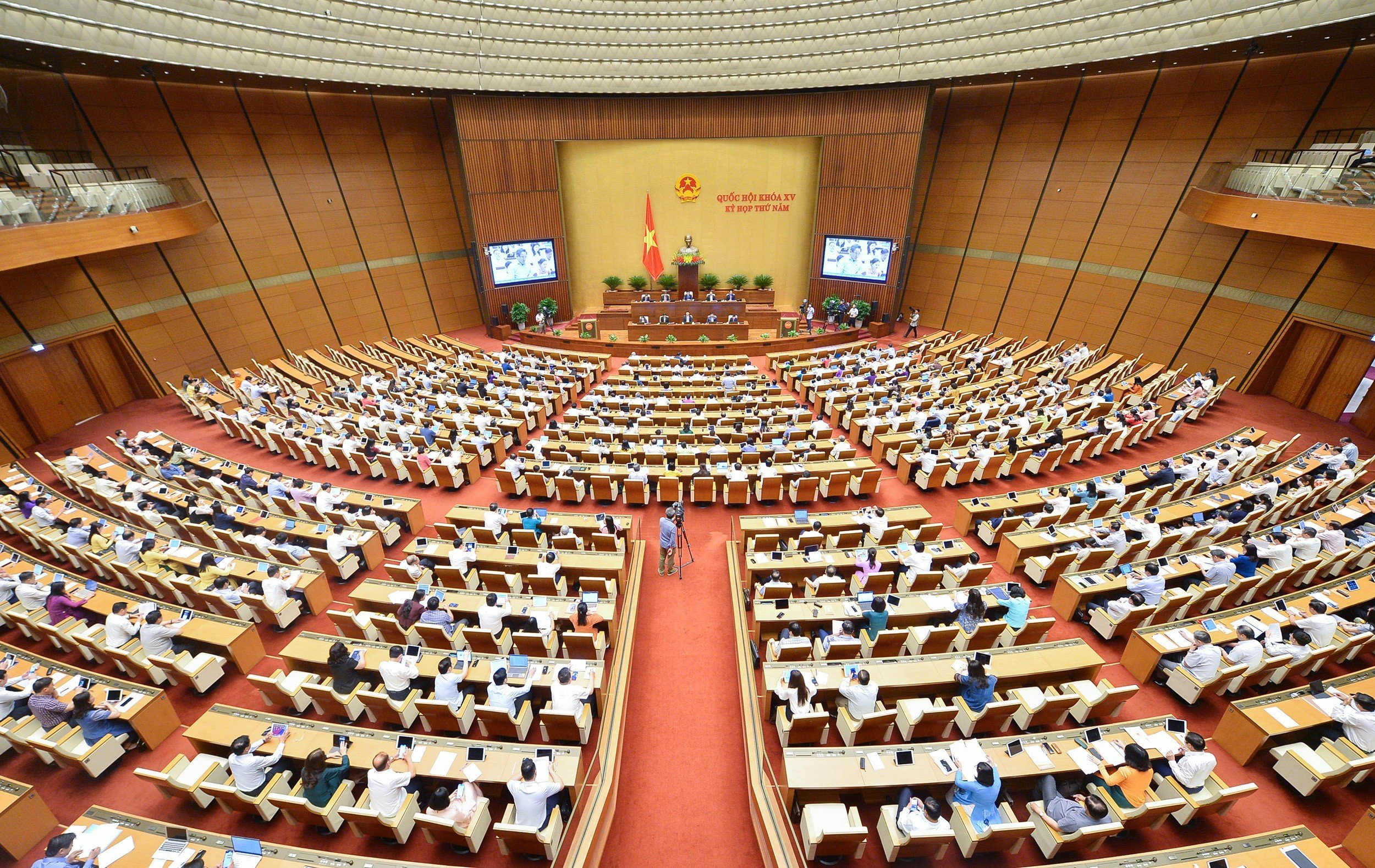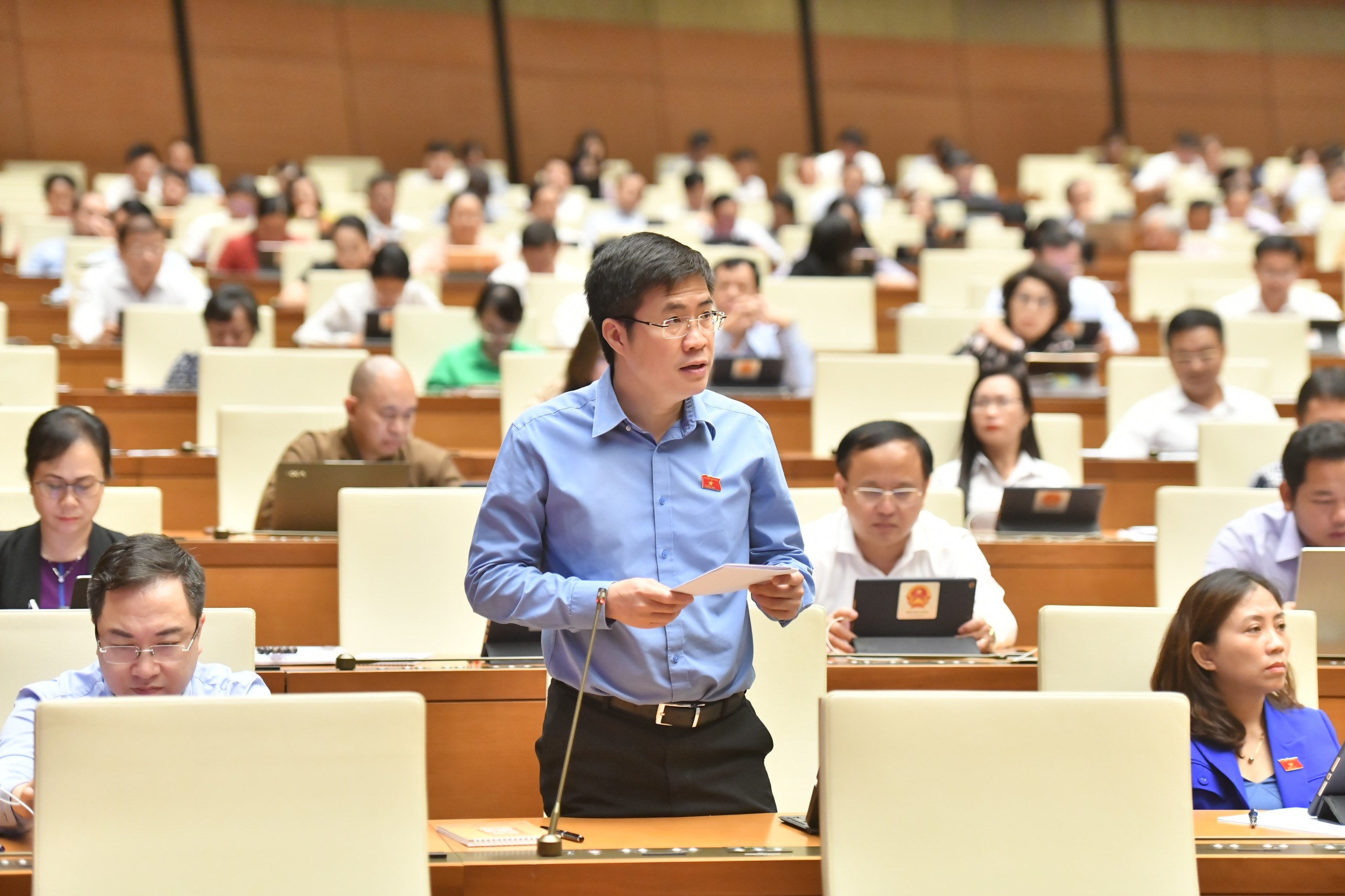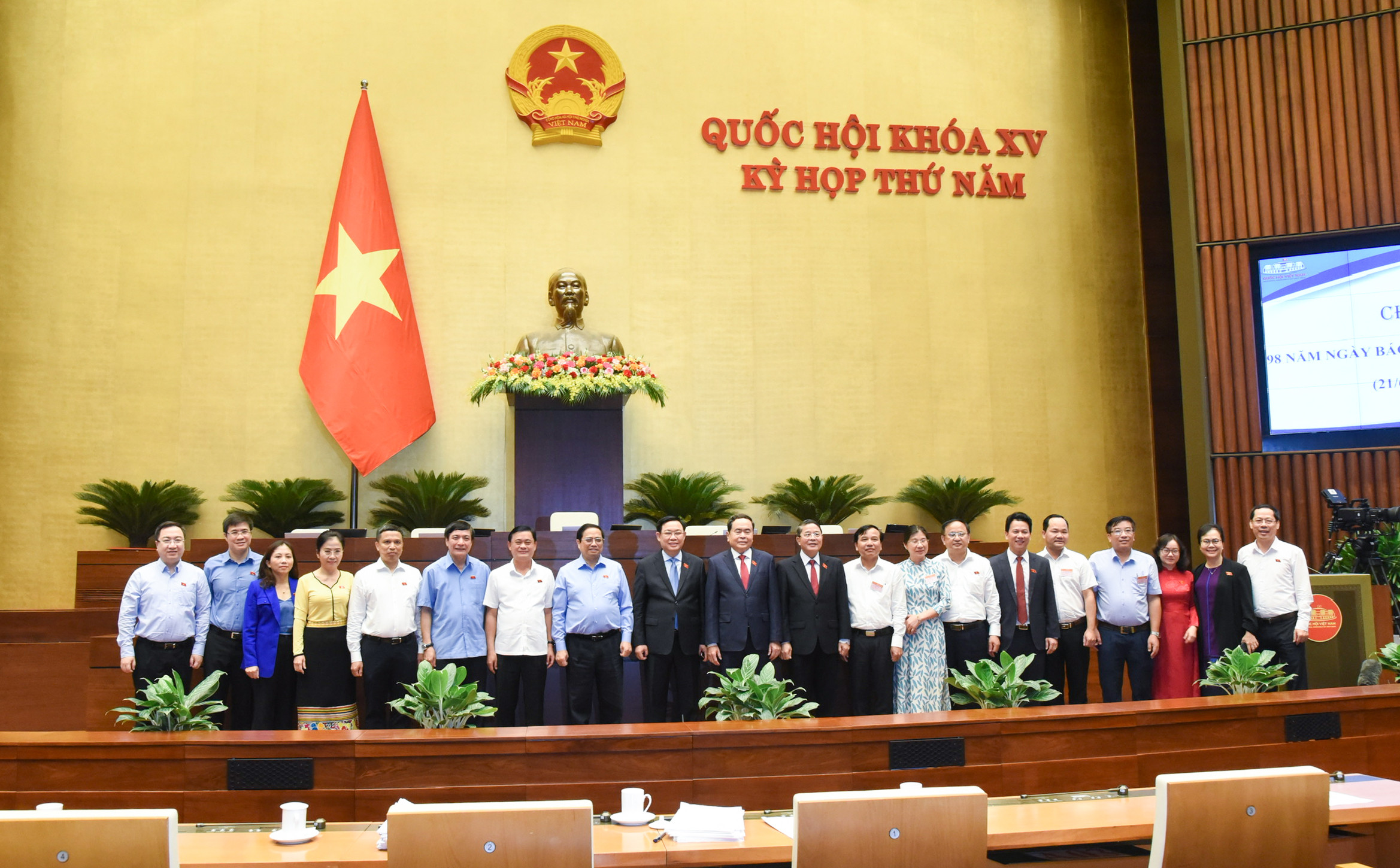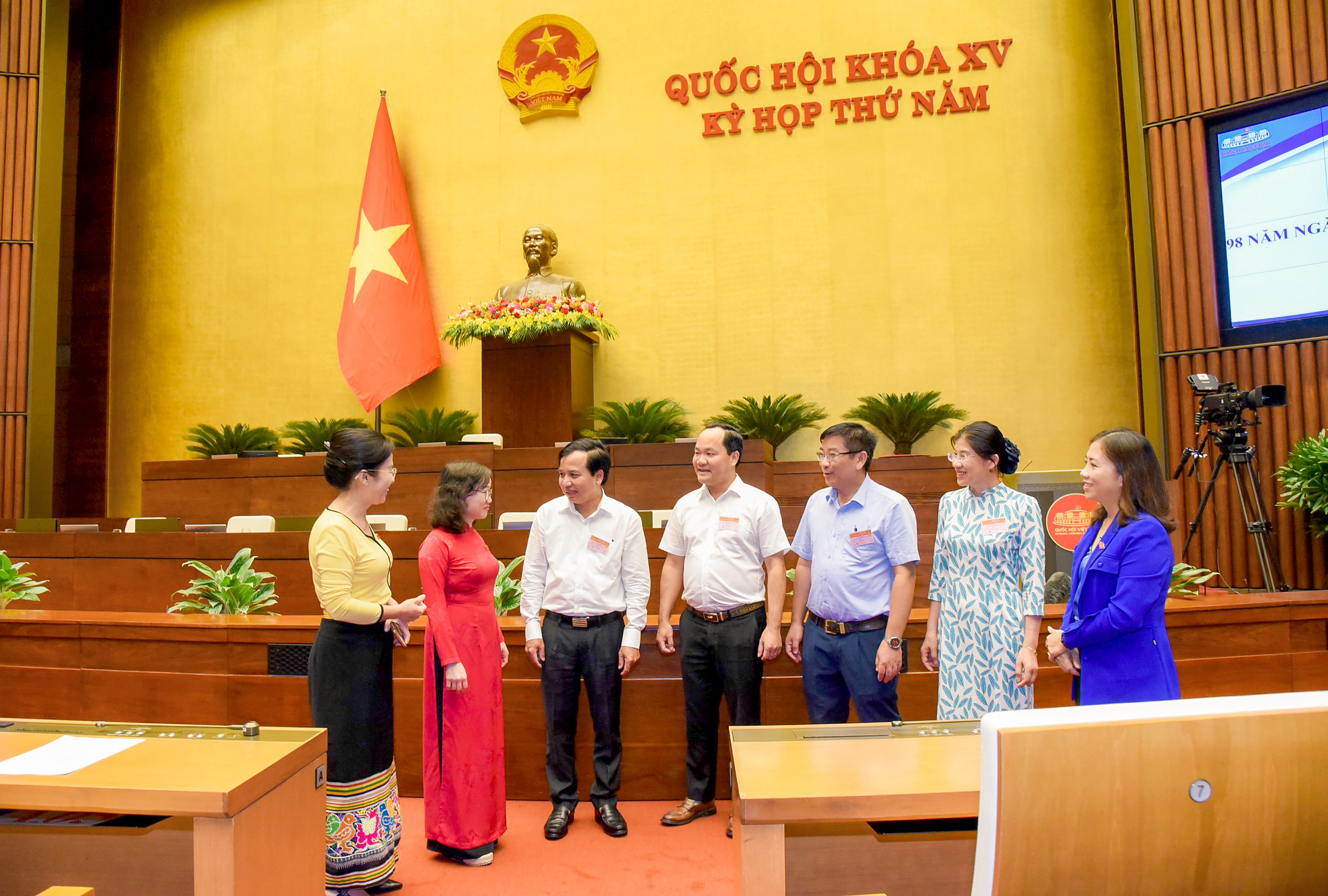National Assembly delegates from Nghe An province proposed solutions to encourage people to record the correct land use rights transfer price on the contract.
(Baonghean.vn) - On June 21, continuing the program of the 5th Session of the 15th National Assembly, under the chairmanship of Politburo member and National Assembly Chairman Vuong Dinh Hue, the National Assembly spent a working day discussing the draft Law on Land (amended).

INCOME TAX FROM LAND USE RIGHT TRANSFER SHOULD BE CALCULATED BASED ON THE DIFFERENCEORDER BETWEEN BUY PRICE AND SELL PRICE
Speaking at the discussion, Mr. Hoang Minh Hieu - Standing Member of the National Assembly's Law Committee, delegate of Nghe An delegation, said that one of the most important issues in the revised Land Law project this time is about land valuation. In the recent past, the drafting agency has made many efforts to absorb comments to perfect this content; however, there are still issues that need to be discussed and researched more clearly.
Regarding the regulation at Point d, Clause 3, Article 159 of the draft on the land price list being applied to calculate income tax from land use rights transfer, according to delegate Hoang Minh Hieu, this is new content which, according to the explanation, is aimed at two goals: First, to create space, encourage people to record the correct transfer price on the contract; and second, to prevent tax loss at the time when the land price list is approaching the market price.

However, the delegate from Nghe An province found that there are still some problems surrounding this regulation. First of all, applying the land price table to calculate personal income tax means allowing people to freely record the value of land use rights transfer on the contract.
“This does not guarantee that it will encourage people to record the correct transfer price because there are many factors that affect the price recording on the transfer contract. For example, intentionally creating a series of virtual transactions to increase land prices in a certain area; or recording incorrect land prices to rationalize the responsibility of declaring assets, or committing money laundering;…”, delegate Hoang Minh Hieu analyzed.
Meanwhile, the provision at Point a, Clause 3, Article 158 of the draft law affirms that the land price stated in the transfer contract is important input information for land valuation. Thus, in turn, incorrect declaration of price on the contract will lead to inaccurate input data. Inaccurate real-time data input will lead to inaccurate valuation for land price list construction. That means both objectives set out in this policy regulation are likely to be unachievable.
The second issue related to this regulation, according to delegate Hoang Minh Hieu, is that the method of calculating income tax based on the land price list as in the draft is not true to the nature of personal income tax, because the price on the land price list does not reflect the income of households and individuals. In some cases, such price calculation is even disadvantageous to the transferor when the purchase or sale is at a loss and does not generate actual income.
From the above issues, the delegate of Nghe An delegation recommended that the Drafting Committee study and amend relevant provisions of the Land Law to both encourage people to record the correct price of land use rights transfer on the contract and calculate the correct personal income tax.
Accordingly, it is necessary to study the method of calculating income tax from land use rights transfer based on the difference between the purchase price and the sale price. This method reflects the true nature of income tax as well as being consistent with international practice.
“When applying this measure, the parties involved will have the motivation to write the correct price on the contract so as not to be disadvantaged in calculating taxes. Specifically, the buyer will not accept writing a price in the contract lower than the actual payment price, because this will directly affect their rights when transferring the purchased real estate,” said delegate Hoang Minh Hieu.
Regarding this issue, he also said that in the past, we were concerned that there would be difficulties in determining the purchase price and selling price due to the lack of specific data at different times. However, in the current socio-economic development conditions, this requirement is completely feasible, when the draft revised Land Law has provisions in Point d, Clause 1, Article 165 on the land price database, allowing the updating of land use right transfer prices in real time. Therefore, applying this option is completely feasible.
NEED MORE SPECIFIC REGULATIONS ON PRINCIPLES FOR APPLYING LAND VALUATION METHODS
Regarding the participation of valuation consultancy organizations, according to the provisions of the draft law in Articles 2, Chapter 11, specific land valuation requires the participation of land valuation consultancy organizations. However, following the practical application of the current Land Law in recent times, delegates found that localities encountered many difficulties in hiring land valuation consultancy organizations.

For example, according to press information, in 2022, Dong Nai province agencies sent documents to more than 150 valuation units, but only 5 applications were registered, of which only 1 was qualified. In Binh Duong, from having dozens of valuation consulting enterprises, there are now only 3 units left.
According to the Ministry of Finance, there are currently 288 valuation enterprises; of which the number with sufficient capacity to appraise land prices is lower because they must meet specific conditions. Meanwhile, according to the draft regulations, valuation will take place at the district and provincial levels nationwide. This is expected to cause many bottlenecks in land valuation work.
Therefore, delegate Hoang Minh Hieu suggested that the Drafting Committee should make specific assessments to have appropriate regulations, especially on the rights, obligations and responsibilities of valuation consultancy organizations, to ensure the feasibility of the draft law.

Regarding land valuation methods, the delegate of Nghe An delegation expressed his agreement with the draft law being accepted and supplemented with regulations on methods used to value land in Clause 4, Article 158.
However, according to delegate Hoang Minh Hieu, the provisions in the draft have not clarified which principles and methods are given priority in some specific cases.
For example, applying the land price adjustment coefficient method, i.e. coefficient K, has the advantage of being easy to implement, does not cause risks to officials and civil servants in performing public duties; contributes to quickly resolving the bottlenecks of many real estate projects in reality.
However, many experts have also commented that this is a unique pricing method, unique to Vietnam. The determination of the K coefficient still has subjective factors and may not closely follow the market price.
Therefore, the application of this method may not be suitable in certain cases, such as in determining the value of land use rights when equitizing state-owned enterprises. Therefore, the delegate suggested that the Drafting Committee should study and have more specific regulations on the principles of applying the land valuation method in the draft law.


